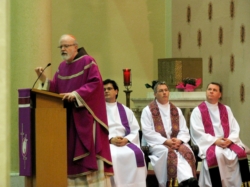Cardinal marks Communion and Liberation anniversary with Mass
WALTHAM -- In a culture cluttered with a thirst for riches, fame and power, the message from Cardinal Seán P. O’Malley to keep our eyes on Christ served as welcome encouragement to Communion and Liberation (CL) members gathered Feb. 29 at St. Mary Parish. The Mass was in celebration of the movement’s 26th anniversary as a pontifically recognized lay association.
“The cardinal encouraged us that in front of everything we must keep our eyes on Christ’s presence in our lives. This is what the Church wants of us and what the charism of the movement educates us to do so that we can always be in communion with him,” said Andre Derrien, responsible for the CL movement in the Archdiocese of Boston. “The fact that the cardinal would come to say Mass with us is a sign of the esteem that the cardinal has for us and the esteem that the Church has for us.”
The Mass also marked the third anniversary of the death of CL’s founder, Msgr. Luigi Giussani, who began the movement in the late 1960s. Msgr. Giussani sought to mend the erosion of faith in Italy that he began witnessing in the 1950s with the rise of Marxism and communism. He reached out to young people, inspiring them to develop personal relationships with Jesus Christ that would translate into their everyday lives.
“In his homily, the cardinal reminded us that the Christian faith at its core is an event, a human encounter, and not a set of rules,” said Father Michael Nolan, pastor of St. Mary’s and concelebrant at the Mass. “We all have the tendency to forget that and everyday we wake up are ruled by our circumstances and we forget that we have to wake up and follow Christ and look for him.”
The charism of the movement Msgr. Giussani began strives to help people encounter Jesus Christ through its three pillars: culture, charity and mission. Culture, in that the world should be judged from the point of view of faith; charity, in the free giving of time and service to others; and mission, in evangelizing and telling others your experience of faith through the movement.
Through evangelization CL grew gradually until it received a validating push in 1982 when the movement was recognized by the Vatican as a lay association and its contribution to the Church was acknowledged. A 1984 private audience with Pope John Paul II, during which the pope encouraged members to take their message into the world, further aided the movement’s growth. With that mandate, CL grew steadily and can now be found in nearly 80 countries around the world.
“When the Church officially recognized the movement and gave us canonical status, she was saying that the method of Msgr. Giussani is valid for communicating the faith and makes stronger the conviction of the intuition of Msgr. Giussani,” said Derrien. “The Church said that what you are doing is the right way and it is what the Church needs.”
The movement came to the United States primarily through graduate and postgraduate students who came here to study, and a small community was founded in Boston approximately 20 years ago. Today, two groups of adults meet weekly for the “School of Community,” a time of discussion and catechesis during which they study the writings of Msgr. Giussani. Groups of CL members are also active at the high school and university level in the archdiocese.
“The movement is not just geared to one kind of audience,” explained Derrien. “It’s for everyone because the proposal of Msgr. Giussani is to live Christianity in your daily life and not as a separate thing to the Church.”
Since Msgr. Giussani’s death in 2005, Derrien said that the movement has experienced phenomenal growth in the United States, spreading from the East and West coasts, where it first took root, to the Midwest.
He stated that within the past five years there has been “an explosion of communities” in the Midwest. The growth of the movement, he explained, can be attributed to how the movement facilitates an encounter with Jesus Christ and thus changes the lives of those it touches.
“We are always looking for something to make us happy and our society and culture puts the good career, getting rich, and having a lot of sex as the ultimate form of happiness, but it doesn’t quite satisfy,” said Derrien. “When people meet someone of the movement they see people who are really happy and really free and they want to have that.”



















